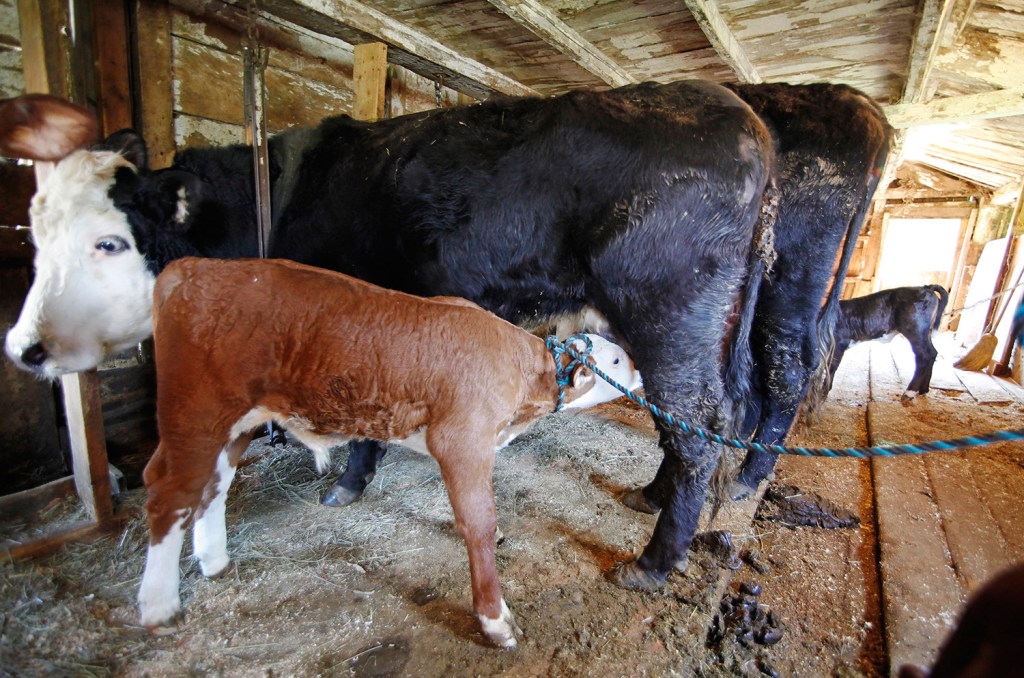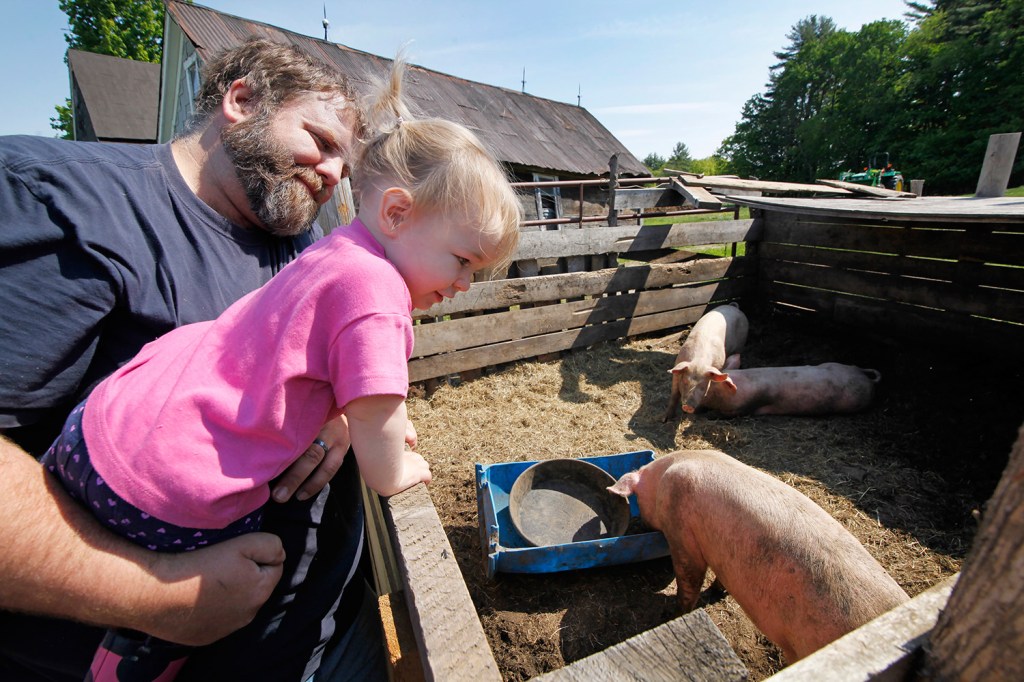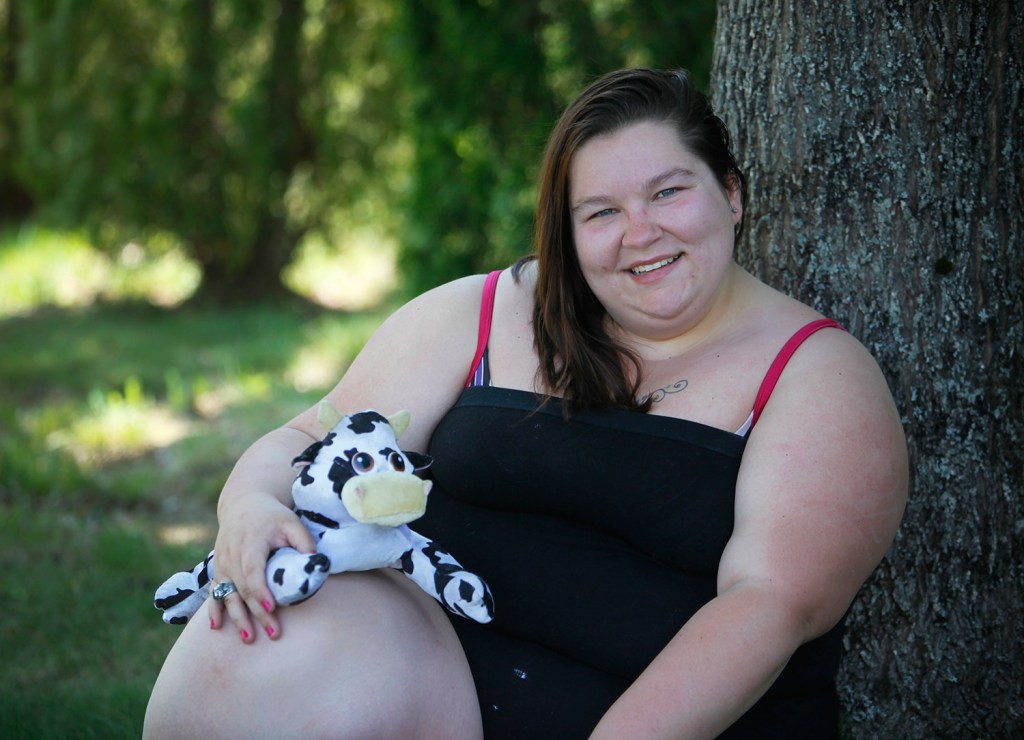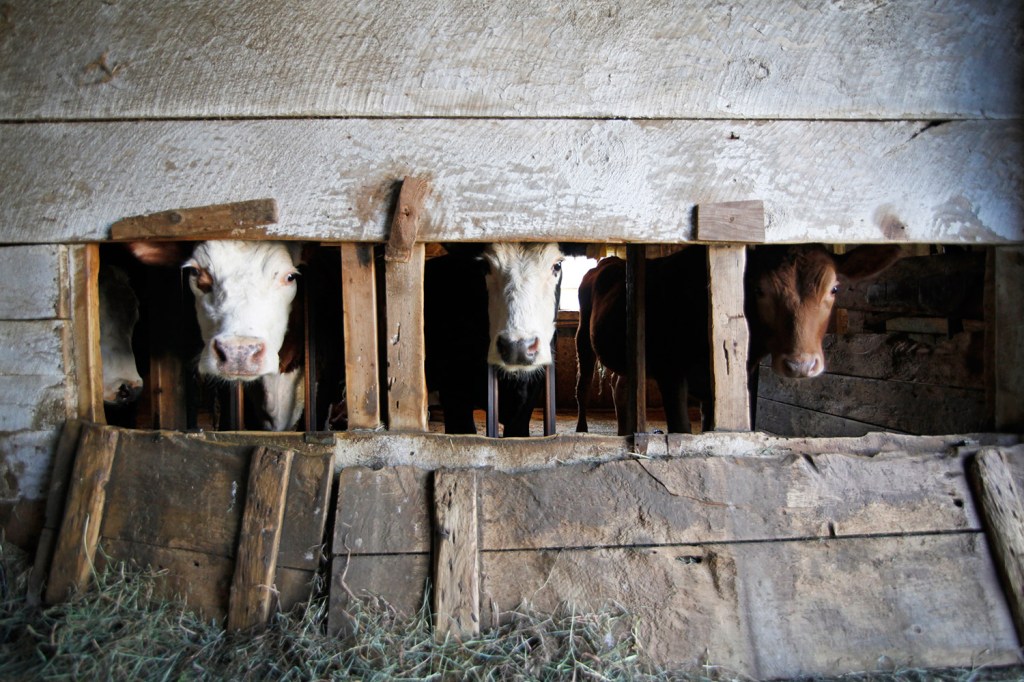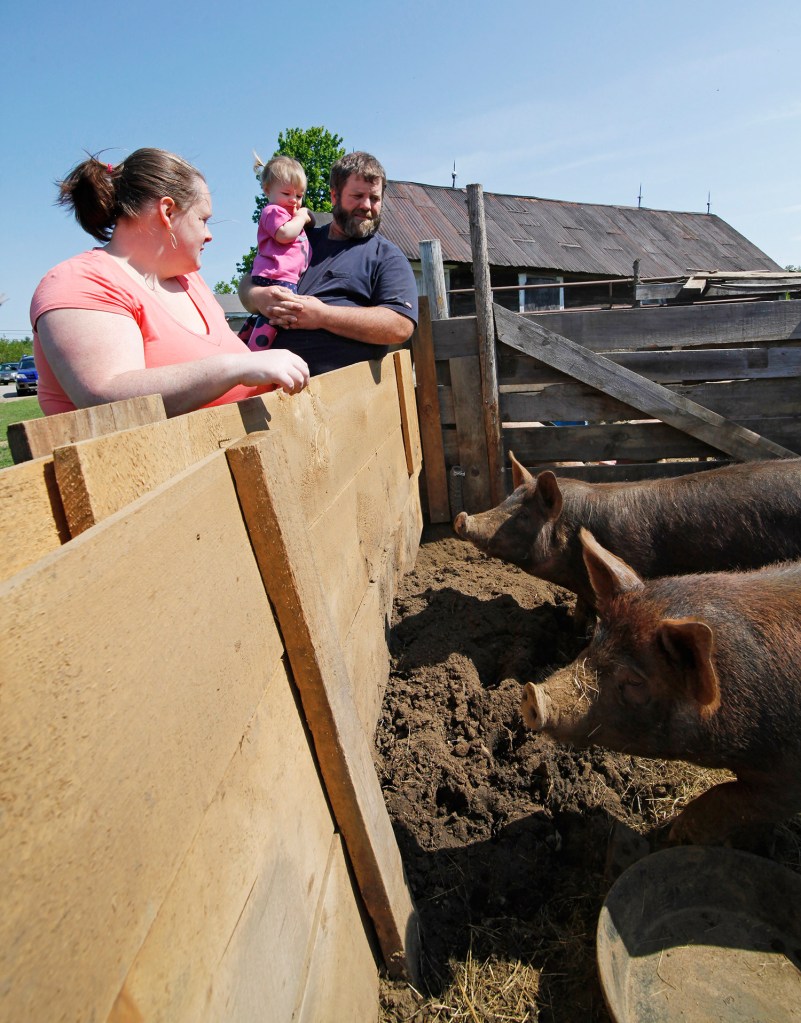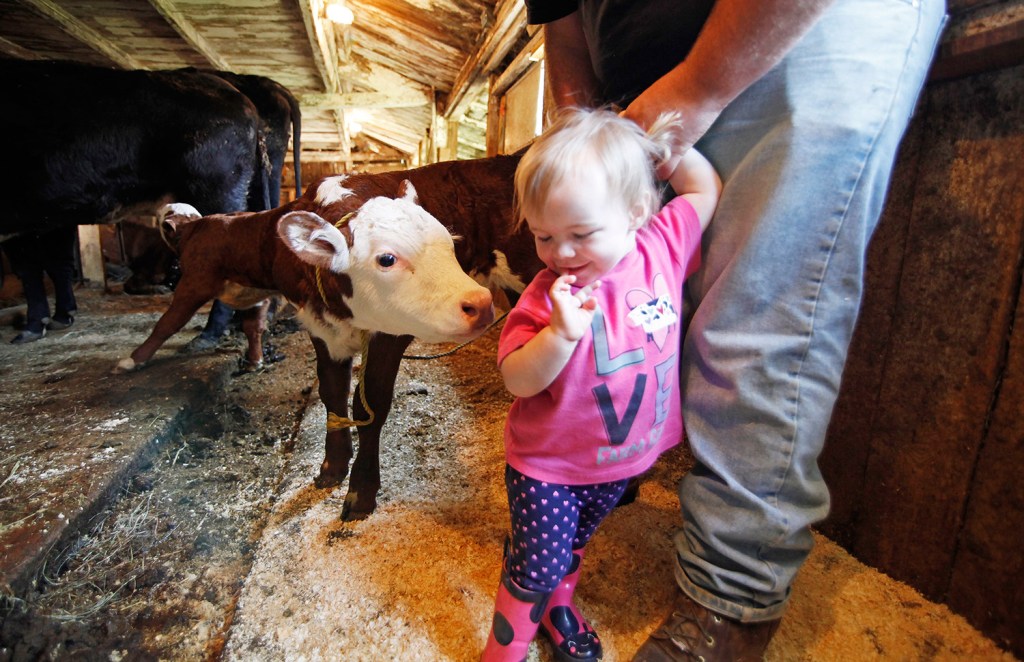When it comes to paying for veterinary care, Michael Doran doesn’t have the deep pockets of a larger farm. He’s raising 14 beef cattle and eight pigs on a Berwick farm that he took over after his father died.
For the past three years, when Doran’s livestock needed veterinary care, he has had trouble finding help. The veterinarian the farm used when Doran was growing up has long since retired. So sometimes Doran just asks “old timers” what to do, or he takes care of the animals himself.
“I can do quite a few things myself,” he said, “but there comes a time when you have to call somebody.”
That’s what happened a couple of weeks ago, when one of his cows was giving birth. The calf was trying to come out backwards, hind legs first, but it was so large Doran couldn’t turn it to the correct position himself. The cow began bleeding internally and Doran found himself frantically calling around for help. Eventually, he connected with a veterinarian, and ultimately both cow and calf survived.
Doran wonders if having help from a veterinary technician early on – basically an extra set of hands – might have prevented the emergency. That kind of help could have been interpreted as making a diagnosis, which is illegal under the Maine Veterinary Practice Act, the law that regulates what vet techs can do without supervision. Still, Doran’s farm emergency highlights the need for all levels of basic veterinary care at the growing number of small farms in Maine that are raising not only cows but animals such as goats, sheep, llamas and alpacas. “Unless you’re a big dairy farmer, there really isn’t any support for you in the area,” Doran said. “There’s a lot of people around raising a cow or two, or a pig, and there’s no vet around.”
WANTED: VET TECHS
Veterinary technicians and technologists could help fill in the gaps, but some Maine experts say there aren’t enough of them. And over the next decade the need will only grow: The U.S. Bureau of Labor Statistics projects that employment in this category will grow 30 percent from 2012 to 2022. Growth will be particularly strong in rural areas, according to the agency.
In Maine, many small farms are being started as second, or alternative, careers by newcomers with little experience. They may need more help with veterinary care since they haven’t grown up around farming like Doran, who knew just what to do when his cow got into trouble. They are also more likely to experience sticker shock when they get the vet bill.
Using a vet tech for minor issues that don’t require a vet’s expertise can save veterinarians time and rural farms money. But at a time when jobs are plentiful for vet techs, the two schools in Maine that train them are in flux. The 15-year-old program at the University of Maine-Augusta’s Bangor campus has had such serious budgetary issues, it was on its way to being dropped last spring before a public outcry saved it. (See sidebar.) It is now being turned into a four-year program – a move some veterinarians oppose – and its accreditation from the American Veterinary Medical Association is in question.
“We’re very concerned about where that’s headed in the future,” said Bill Bell, executive director of the Maine Veterinary Medical Association.
A new vet tech program at York County Community College started offering classes in fall of 2013. That program is not yet accredited, but it’s two-thirds of the way through the process, according to Peg Wheeler, the director, and the school is having no trouble filling classes.
JOB DESCRIPTION
Licensed veterinary technicians and technologists serve as an extra pair of hands for veterinarians. Veterinary technicians graduate from a two-year program, while veterinary technologists graduate with a bachelor’s degree. Technologists often work in research-related jobs.
Vet techs perform the lab tests that aid the vet in diagnosing problems. They take case histories, administer medications, draw blood, take and develop X-rays, prepare tissue samples for examination, provide dental care, prep animals for surgery, and provide nursing care or emergency first aid. By law, only veterinarians can diagnose, make prognoses, prescribe or initiate treatment, or perform surgery.
“A licensed vet technician is definitely worth their weight (in gold) because they come with a lot of training already done, and then you can do continuing education,” said Matt Townsend, a Fairfield vet who sees both small and large animals. Townsend said that on the large animal side of his practice, sending his techs out to farms to do vaccinations and collect blood samples allows him to focus on more important things.
“That can potentially free me up to do more with each farmer,” Townsend said. “And you can make a case that by doing those things, that would allow me to travel a farther distance to other farms.”
Farm animal care, including large food animals such as cows and smaller farm animals like goats, pigs and even chickens, is where the biggest need lies. (There’s more money in equine care, so there is no shortage of vet techs there.)
“Where there’s a huge gap is in ruminant medicine,” said Brion Reagor, a small animal vet in Berwick who is on the advisory board of the vet tech program at York County Community College. “It’s really difficult for my friends who have smaller ruminants on these farms to find someone who can come out.”
Wheeler, the director of the York County program, said that neighboring New Hampshire has pushed the focus on large animal vet techs in its schools because of a surge in livestock in the state. Wheeler sees the same need in Maine and so plans to develop a similar focus at the York County school.
STUDENT OUTLOOK
About a quarter of the school’s students are interested in large animal work, Wheeler said. Many of them choose the vet tech career path over pre-vet programs that are more expensive and leave them saddled with student loans. Some may decide to go on to vet school.
Sarah Tanguay, a 24-year-old vet tech student who lives in Biddeford, has completed three semesters in the York County program. She considers the two-year program “a good foot in the door for me to decide what I really want to do.”
“Going to school for eight years to become a veterinarian is just not for me,” she said.
Tanguay would like to stay in Maine after she graduates and is leaning toward working with large animals. She likes cows, and “there’s not a huge demographic of people who work on farm animals. A lot of times the veterinarian and the technician are from hours away.” And she can’t help but notice the increasing number of small farms around the state.
A REAL SHORTAGE?
Not everyone agrees that the word “shortage” applies when it comes to vet techs. Each vet asked about the topic seems to give a different opinion.
A few years ago, the state had too few veterinarians, but loan forgiveness and scholarship programs designed to keep vets in rural areas have mostly fixed the problem, according to Michele Walsh, the state veterinarian. “Yes, we have a lot of new small farms, and that’s really exciting,” Walsh said. “I love to see that. I’m not really sure that changes the demand for veterinary services, necessarily.”
A lot of smaller farms simply make do. They turn to other farmers for help, or to the Cooperative Extension service, because they don’t have the money to pay a vet to drive 50 miles.
“I guess shortage implies that there’s a need that can’t be filled, and I think practices find a way to fill it,” said Bell of the Maine Veterinary Medical Association. “They will hire someone as a vet assistant who does not have the same qualifications.”
Some vets worry that the work of vet techs will eat into their bottom lines, but to Townsend it’s a question of figuring out how best to use these employees.
Townsend not only thinks there is “a large need” for more vet techs, he thinks the veterinary profession should start talking about how to expand their role and training, making them more like nurse practitioners in human health care. He says having vet techs with different levels of training would give vets like him more leeway. He’d like, for example, to be able to send a vet tech to a farm to check on a couple of sick goats and let the technician decide whether it’s an illness that can wait until tomorrow or requires the vet’s urgent attention.
Michael Doran wishes a vet tech had been available to play bovine midwife during his emergency, so that maybe things might not have progressed into dangerous territory. His cow stopped bleeding in the early morning hours, and his new vet returned for a follow-up a couple of days later.
“You put the care in,” he said, “and you don’t want anything to happen to them.”
Send questions/comments to the editors.



